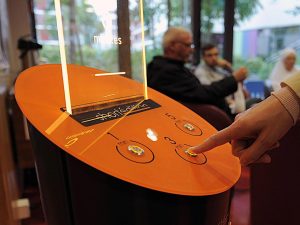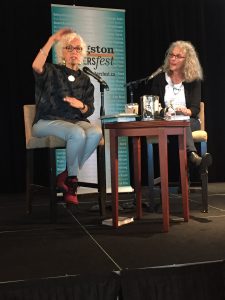[vc_row][vc_column][vc_column_text] Fall is prize season, with awards tumbling down like apples from orchard trees. Many bookish folk fashion their winter reading lists from the finalists, thinking to broaden their reading reach. But what if the prizes themselves create enclaves into which only certain writers are allowed?
NEWS FROM THE WORLD
Sidling Up to the Age Bar
Take prizes for young writers, for example. Encouraging the young is laudable, writes Joanna Walsh in The Guardian but, she points out, “There’s a correlation between setting an age bar and encouraging the already privileged.”
Age bars can be discriminating in indirect ways. Only the economically privileged can afford an MFA or devote themselves to writing at a young age. A person who is economically or culturally disadvantaged might take much longer to debut. Female writers, for instance, often delay their careers to raise children which means they may “emerge” later than their male counterparts. Writers with physical challenges or health issues may come even later to publishing. Writers from cultural groups whose voices publishers deem “marginal” may not emerge at all.
Walsh offers a simple solution to this embedded discrimination. Replace “young” with “new” or better yet, “emerging.” And I would add: expand the definition of “published.”
Instead of consolidating racism, sexism, class, and gender discrimination, prizes—through careful criteria and thoughtful language—can help bring those walls tumbling down.
The Ghost in the Machine
 Humans, argues Franklin Foer, in his new book World Without Mind, are by nature tool-makers and tool-wielders. But the existential threat of Big Tech might change all that. He worries that in giving over our work to machines, we are, in fact, giving over ourselves to those who operate the machines.
Humans, argues Franklin Foer, in his new book World Without Mind, are by nature tool-makers and tool-wielders. But the existential threat of Big Tech might change all that. He worries that in giving over our work to machines, we are, in fact, giving over ourselves to those who operate the machines.
“I worry that we’re headed to a world of total surveillance—and that the presence of watchful eyes will inhibit us from thinking original, subversive thoughts. I worry that we’re outsourcing too many of our mental activities to machines—and these machines are run by a small handful of monopolistic corporations…I worry that the big technology companies use their surveillance of us to create a portrait of our mind, and that they exploit their intimate knowledge of us to keep us clicking and watching. In short, I worry that we’re headed to a world without contemplation, a world lacking in originality and depth.”

Paper as a Breath of Fresh Air
Train stations in France now offer vending machines that print stories while you wait. Just press 1, 3, or 5 to receive a free fairy tale, poem, or bit of classic or modern fiction that takes that 1, 3, or 5 minutes to read. Described by publisher Shortédition as “a journey before the journey,” the goal is to encourage reading and promote writers.
“The paper medium is a breath of fresh air,” says the director of Shortédition. “It’s more unexpected that a smartphone screen.”
In Books We Trust
Indigo, Canada’s online and bricks-and-mortar bookseller, came in sixth this year in an annual study that assesses which brands Canadians trust the most.
Conducted by the University of Victoria School of Business, the study surveyed more than 6,500 consumers about nearly 300 Canadian companies across 26 industry sectors, and asked them to rank the companies on customer service, quality of product or service, and their values and sense of social responsibility.
The bookstore chain came in sixth, behind Mountain Equipment Co-op, CAA, Costco, Fairmont Hotels, and Ikea.
NEWS FROM MY CASITA
 The Convict Lover at 30
The Convict Lover at 30
On Saturday, September 30, 2017, Project Bookmark Canada unveiled a plaque marking the place of The Convict Lover in our country’s literary landscape.
Almost exactly thirty years ago I discovered the letters that became this book. The research and writing took eight years, and all that time I thought that maybe a dozen people would want to read such an old-fashioned tale. But others saw what I saw—a deeply human story about the irrepressible urge for human connection.
 At a time when monuments are being pulled down because they enshrine the stories of victors, the powerful, it moves me deeply to see the installation of this monument, which recognizes prisoners, men (and women) who are particularly vulnerable to the abuses of power, whose voices are rarely heard and when they are raised, are too often dismissed by those who forget that they are human beings, like the rest of us—flawed, hopeful, despairing, desperate for human contact.
At a time when monuments are being pulled down because they enshrine the stories of victors, the powerful, it moves me deeply to see the installation of this monument, which recognizes prisoners, men (and women) who are particularly vulnerable to the abuses of power, whose voices are rarely heard and when they are raised, are too often dismissed by those who forget that they are human beings, like the rest of us—flawed, hopeful, despairing, desperate for human contact.
If you come to Kingston, make Garrigan Park one of your stops. In fact, follow the entire and the Bookmark Canada Trail across Canada!
FROM THE DEPARTMENT of How Time Flies
My summer was taken up with revision of my novel Refuge, due out in fall, 2018. For the first time, I asked 10 people to be my beta readers. (It’s the manuscript that is second-rate at that point, definitely not the readers!) I selected each reader for their unique perspective—Burmese speakers, a nurse, millennials, a nonagenarian. They not only caught a thousand small errors and omissions, they gave me a fresh perspective on the story, which created the distance I needed to dive back in and make this book as good as it could be. Thank you!
Autumn brings a fresh round of festivals, with onstage appearances and workshops. Please drop by for a chat!
 LINKS I LOVE
LINKS I LOVE
Miriam-Webster has introduced a new etymology tool called Time Traveller. With it, you can find the precise moment when a word first entered the printed English language.
A quick look at 1949 revealed these words and phrases, newly hatched the year I was born: Cobb salad, coronary heart disease, flip side, hologram, lonely hearts, pyramid scheme, same-sex, six-pack, sweet spot, and my personal favorite, writer’s block.
 THE BEST LITTLE BOOKSHOP
THE BEST LITTLE BOOKSHOP
The Tamworth Book Shop, located in the wee village of Tamworth 45 minutes northwest of Kingston, lives in a small, two-storey, red-brick coach house on the front lawn of the bookseller’s property. The books are so well chosen and well-displayed, I wanted to move in.
The physical shop is only open April through December. Fortunately, Robert Wright also operates an online store that specializes in nineteenth and twentieth century literary first editions. But you have to make the trip to Tamworth to see the odd and delightful button collection that lines the top of the shelves in the Tamworth Book Shop.
Biiiiiiiiiig CONGRATULATIONS!
With every LitBits newsletter, I draw a name from my subscriber list to gift with a book. In honour of the Bookmark Canada plaque, I’m sending a signed copy of The Convict Lover to Donna Sharkey.
Thank you for reading LitBits!
Happy reading,
Merilyn




3 Comments
Interesting that Franklin Foer worries not so much about technology as about the people who control it. In my book Technology, I posited that it is technology as a concept, or an idea, that humans have adopted as our Farmer. To some extent, technology does seem to have its own volition, and proceeds apace whether or not it is made to do so by its technicians. For example, no one thinks that cloning human beings is a good idea, and yet it has almost certainly been done. We are in an era in which technological “advances” take place simply because they can, not because they are needed or even wanted. I fear that the machine operates entirely without a ghost at the wheel.
Reading this in Toronto, where I hope to see you next month, as usual enjoyed every BIT of LITBITS but was particularly amused by the French train station story… haven’t seen such a machine so far, but can tell you about another aspect of train travel reading… in the NIMES station there’s a coffeeshop with shelves full to overflowing with used books for travellers to read while they wait for their trains and I believe they can be taken away too although I haven’t tried myself… Constantly replenished by donation, the shelves contain not only French books but every so often those books I am forced to cull from my own shelves in order to make room for new… there are plenty of English-language readers passing through Nimes and I feel less terrible when I cull knowing my books will still be read.
Just read your blog. Respecting the fact that there are some differences on possible points of entry (and exit!) in all the arts, in the visual arts at least, the term ‘emerging’ has come to mean the same as ‘young’. As much as young artists need support (and are getting it through our grants and awards system), senior artists, even those who’ve had some measure of success through a long career, face tough times as they get older. I’m working on an idea for a project for CSARN, “to raise the profile of senior artists, to recognize them as valuable and productive elders who are essential to the continuum that ensures the health of the arts in Canada”, as a counterpoint to the customary practice of focussing on emerging artists.